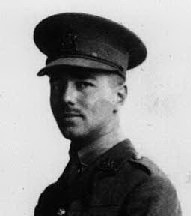DUSTIN'S POETRY PROJECT | Welcome
Wilfred Owens
Wilfred Owen
(1893-1918)
poet, patriot, soldier, pacifist

"My subject is War, and the pity of War. The Poetry is in the pity."
--Wilfred Owen
A serious child with a religious upbringing, Owen was a shy, intense, and scholarly boy who read constantly and endured by a mother who urged him to become an Anglican priest. However, Owen did not go into religious life and instead left for Bordeaux, France, where he was teaching English in the Berlitz School when the war erupted. He visited hospitals and became acquainted with many of the war's wounded. Deeply affected by these visits, the 22 year-old young Owen returned to England and enlisted in the British Army. Owen described his decision in September, 1915: "I came out in order to help these boys--directly by leading them as well as an officer can; indirectly, by watching their sufferings that I may speak of them as well as a leader can. I have done the first." He joined the Artists' Rifles - he was surprised to find no artists in the unit - and after training in London was commissioned in June 1916 as a second lieutenant in the Manchester Regiment where he is described as being a competent and sympathetic leader to his soldiers.
In the middle of January 1917, Owen was transferred to the hell of the trenches in France where his outlook on life changed permanently. In late April, Owen found himself stranded in a badly shelled forward position for days looking at the scattered pieces of a fellow officer's body (2/Lt. Gaukroger). He was diagnosed with "neurasthenia" and evacuated from the front to Craiglockhart War Hospital near Edinburgh where he wrote most of his great poetry while convalescing. Owens was bitterly enraged at the senseless killing of the battlefields and the inability of anyone (especially the church) to stop it. He felt enormous pity for his fellow soldiers who suffered, fought, and died in the mud and misery of the trenches. He was horrified at what his eye saw at the front. Owen started the war a cheerful man but during the two years of war he was changed forever. This is all immortalized in his poetry.
In August 1918, after his friend, the other great War Poet, Siegfried Sassoon, had been severely injured and sent back to England, Owen returned to France where he longed to return to the front although he seemed to know he would be killed there. War was still as horrific as before, but during an attack during the first days of October 1918 he won the Military Cross. Owen was finally machine-gunned to death at the Sambre Canal near Ors in one of the last attacks on the German lines of the war on November 4, 1918. Owen, one of approximately 9,000,000 million fatalities in World War I, was twenty-five years old when he was killed.
Owens wrote this letter after finding refuge in some adandoned homes. It was finished shortly before his death.
"Dearest Mother,
So thick is the smoke in this cellar that I can hardly see by a candle 12 inches away. And so thick are the inmates that I can hardly write for pokes, nudges, and jolts. On my left, the company commander snores on a bench. It is a great life. I am more oblivious than the less, dear mother, of the ghastly glimmering of the guns outside and the hollow crashing of the shells.
I hope you are as warm as I am, soothed in your room as I am here. I am certain you could not be visited by a band of friends half so fine as surround us here. There is no danger down here - or if any, it will be well over before you read these line..."